Tips on Creating a Mobile Booking App for Travel and Tourism Businesses
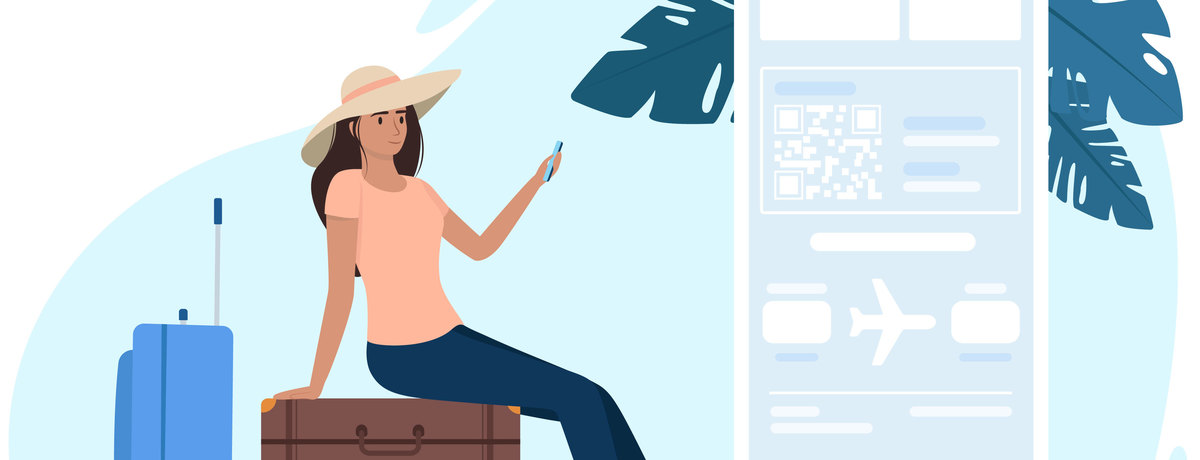
Travelers’ expectations for customer experience have drastically changed over the last decade. Service providers work hard to meet these expectations in flight or hotel booking, in-destination check-in, and in customer support. Travelport Digital’s researchrevealed that mobile apps are the go-to for traveler engagement, as well as why they may be preferred over mobile web.
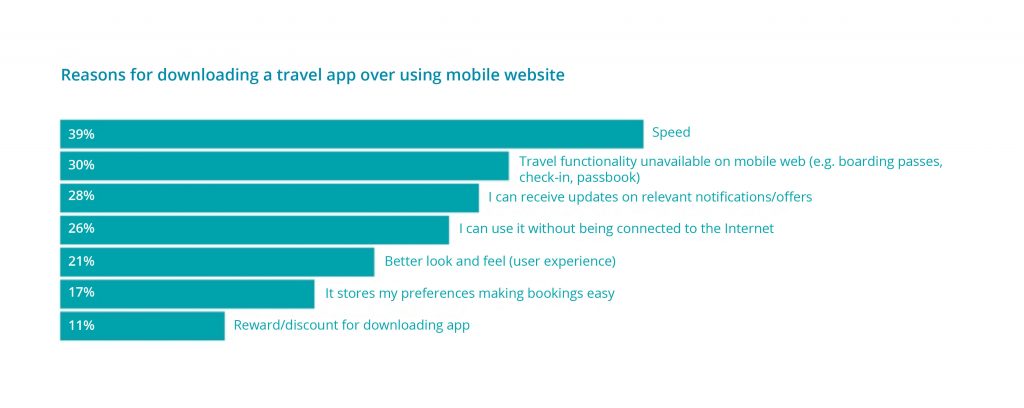
Booking through mobile devices drives the growth of digital travel sales. Last year’s global sales were estimated at $694.41 billion. They are expected to reach $869 billion in 2021, and mobile sales can make up nearly half of that amount. If you want to keep up with the trend, it’s time to think about how to make a booking app for your business.
Steps for Building a Mobile Booking App for Travel Businesses
As a rule of thumb you can follow this checklist to create a booking app minimum viable product (MVP):
- Research electronic travel market.
- Determine the type of the future booking app.
- Analyze rival mobile booking apps.
- Define a unique value proposition (UVP) and monetization strategy.
- Agree on the app distribution area and platform.
- Make a list of the app’s core functionalities and features.
- Engage software development professionals with relevant experience.
- Monitor the app development process from the UX/UI design phase to usability testing.
- Launch an advertising campaign if necessary.
- Publish the booking app for your target markets.
- Collect customer feedback and analytics.
- Think over the app’s additional features and scale up.
Technically, the steps are similar to the stages of a messaging, dating, or any other mobile app development. In the following chapters, we’ll concentrate on travel-specific aspects.
Considerations before Building a Travel Mobile Booking App
Booking App Types:
- OTAs; these are online services which allow clients to have multiple booking options: flight tickets, hotels, car rentals, etc. Trip.com, Hopper, and KAYAK belong to this type of apps.
- Aggregators; the primary purpose of hotel aggregators and similar mobile apps is to garner information from respective service providers and share it with users. The best-known hotel aggregators are Booking.com, Hotels.com, and TripAdvisor.
- Brand/chain apps; Individual hotel businesses, airlines, bed and breakfasts, car rental companies, and other service providers develop these apps. Hilton Honors and Marriott Rewards are good examples.
The app type depends on your business objectives. For instance, if you’re a hotelier, you might partner with local businesses to offer your patrons the ability to rent a car or arrange a fishing trip from your app. If you’re a tech entrepreneur, you can aim to create a booking aggregator or an OTA app.
Unique Value Proposition (UVP) & Monetization Strategy
Winning potential users comes down to a UVP and right positioning. Here’re some worthwhile models for consideration:
- Last-minute booking deals; Booking.com, Travgo, and HotelTonight are some of the companies which offer this UVP.
- Cheap booking options; many tourists, especially millennials, are either looking for, or feel perfectly fine about, the cheapest flight and stay options. HostelWorld, HostelBookers, and some other companies have chosen this model to target low-cost travelers.
- Room sharing / Apartment rental; Airbnb adopted both room-sharing and short-term apartment rental business models.
- Short stays; some people need to stay no longer than one night while traveling. For instance, Dayuse.com offers one-day booking at a cheaper rate.
- Peer-to-peer model; the Couchsurfing app is assisting thrifty travelers with free stays, but it’s also about cultural exchange and friendship. So is Locali, an upcoming mobile app whose design was created by Alternative-spaces. The app marries Tinder and Foursquare City Guide, enabling tourists to explore cities and connect with locals and other travelers.
You can drive revenue via your mobile bookings app using one or several monetization models. Knowledge of the target audience is of paramount significance when the methods are selected.
Here’s a list of common monetization models for mobile travel apps:
- Marketplace; you can charge fees to hotels and other service providers that wish to operate on your platform.
- Service fee; you may choose to charge a fee for every booking made via your application. Booking.com charges hotels and apartments that were booked by users while Airbnb charges a commission to users.
- Advertising; for example, hotels may pay for advertising on your platform if they desire to be in the top search results in a single query (e.g., city or region).
- Subscription; a subscription can be offered to users if they want to access more interesting offers and discounts.
- In-app purchases; if your app is free, offer a premium version with more features or without ads.
This is not an exhaustive list. Choose the model that matches your business goals. Consider multiple monetization models to maximize your revenue.
Choose the Platform(s) & Distribution Area for Your App
It’s a great thing if you can run the app globally rather than focusing on the local market. However, it may require significant investment and time to take your app to the international level.
Therefore, it’s sensible to start with the local market as it will save both time and money. Furthermore, you can test the app and see how well it functions locally.
If you’re going to serve budget travelers, especially in developing countries, or wish to reach the largest audience possible, Android is your go-to platform. Otherwise, it may be preferable to publish your app on the App Store first.
Securing the Sources of Data
Booking.com and many other hotel aggregators work on agreements with hotels. They install their special software to monitor in real time the availability of spare rooms to maintain a regular stream of bookings.
Many APIs grant access to hotel listings, including, Zodomus, EPS Rapid, HotelsCombined, and Google Maps Platform.
Admin Panel
Admin panel is part of every mobile booking app. The lack of a well-thought-out tailored solution makes it difficult to manage all listings and trace essential data.
Other things have to be considered before building a hotel or flight booking application including:
- the cost of the user-facing part of the product
- expenses on the admin panel and infrastructure solutions
- cloud-based storage integration implies using incorruptible data storage methods. A booking app which uses cloud-based storage to store and retrieve information protects it from hackers and helps to secure the users’ privacy.
Features of a Mobile Travel Booking App
The main features of an MVP for a mobile booking app coincide with a corresponding website. Now we’ll focus on some features crucial for a mobile service.
1. Simple Call-to-Action Buttons & Navigation
Customer experience begins when the user opens your app. Make the background vivid and inspiring. Animated graphics, e.g., beach sand and surf, may look fabulous on a splash screen. The login/registration page may repeat it, but shouldn’t distract the user from the buttons and text fields. Give users the freedom to create an account with an email, phone number, or via social media accounts. The latter is more convenient for users and more beneficial for app owners.
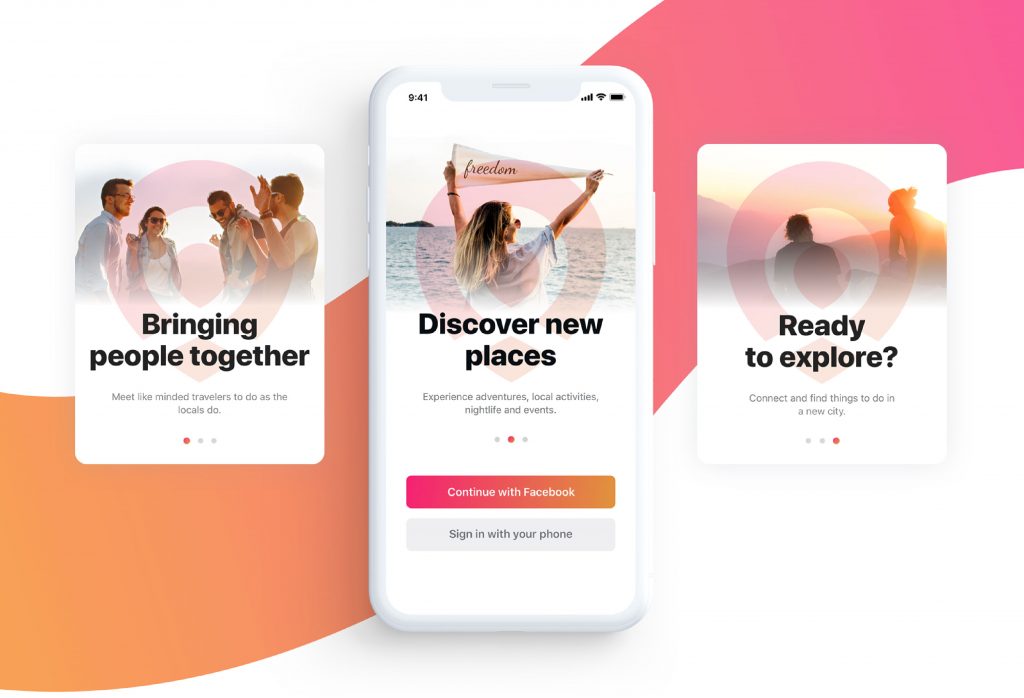
Users expect to accomplish their goals with minimal effort. Thus, your app should have simple, easy-to-follow navigation, with clearly defined CTA, guiding the traveler to move forward at every stage of the booking process.
2. Personalized and Practical Search Engine
According to the same research by Travelport Digital, search is the top reason for using a travel mobile application. The app should have precise, flexible, and self-explanatory search options.
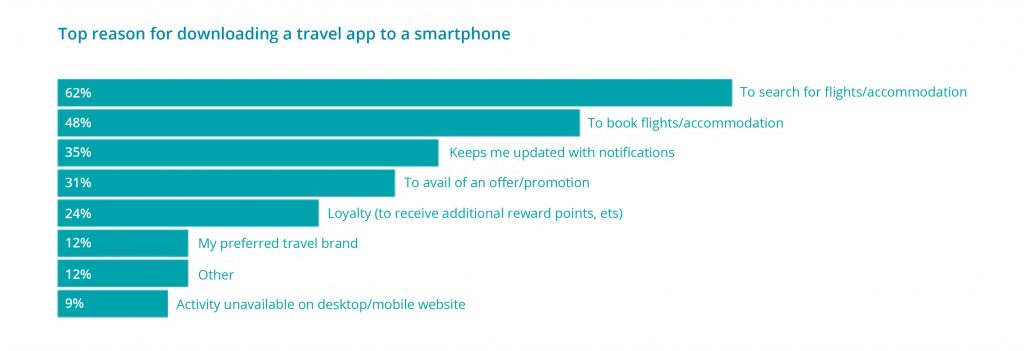
Let’s look at how search options can be made efficient:
Flexible search filters. Search filters should help narrow the results according to user search priority. Booking.com and Skyscanner are prime examples of flexible search options; users can sort search results based on star rating, price range, review score, and popularity.
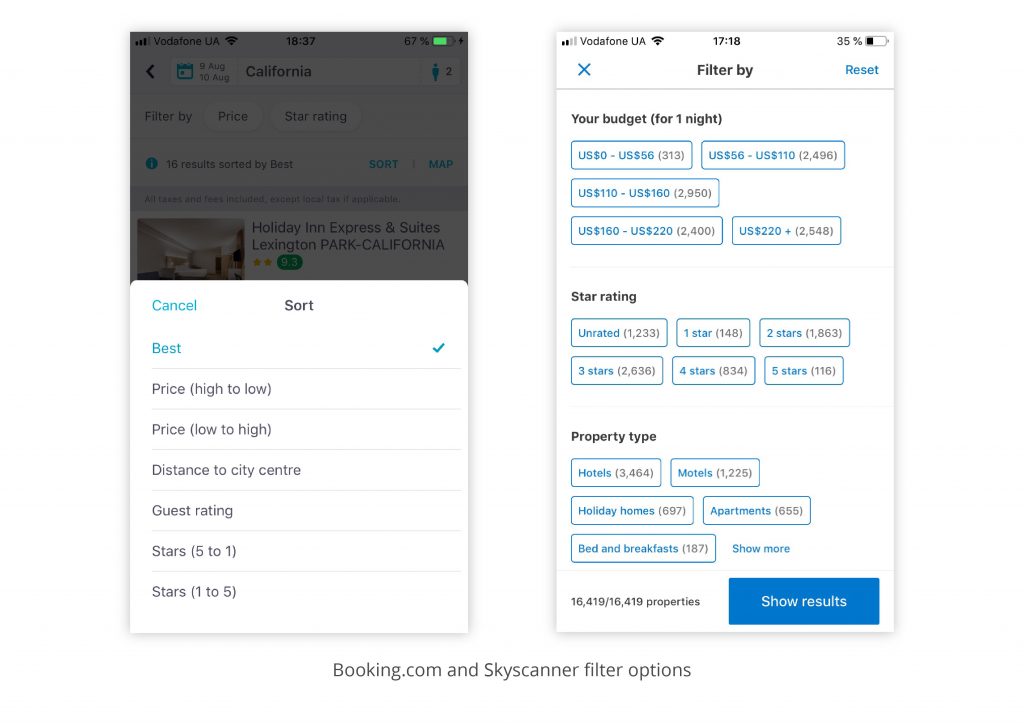
Accessibility and visibility. Search options should be easy-to-access and visible. Compare searching for accommodation on the map in Airbnb and Booking.com. Airbnb indicates price on the map so you can choose the location and see the accommodation fees. With Booking.com, the icon of each hotel needs to be clicked to find the accommodation cost.
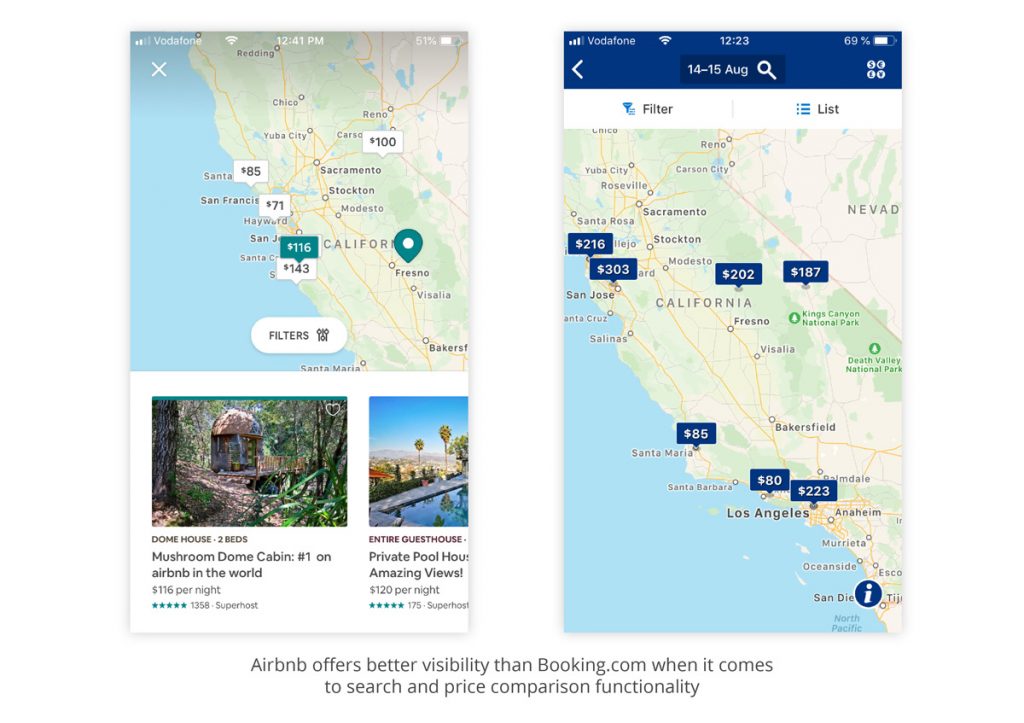
Personalized suggestions. It’s helpful for your product to have personalized suggestions based on the user’s online booking history. If a certain location has already been visited, it’s a good idea to suggest visiting a similar place.
Content prioritization. A search results page should be designed according to your business interests. See how differently Booking.com and Skyscanner search results are displayed.
Booking.com presents more items (with small images of properties) in a single screen than Skyscanner. The latter offers large photos with only the most basic information. The difference is a result of their different goals.
Skyscanner, with its powerful metasearch engine, connects travelers with airline websites or with hotels and OTAs. The main purpose is to inspire and attract users to visit a service provider’s website. Booking.com has a different booking system, as it is a direct reseller. Its main objective is to have users make flight and hotel bookings immediately. As a result, there are more detailed offers on Booking.com.
3. Simple, Transparent & Secure Payment Process
Make sure that your payment process is clear and easy-to-follow.
Multiple payment options
It’s wise to have multiple payment options for your customers’ convenience. Consider integrating Apple Pay, PayPal, and Android Pay into your booking system, as well as traditional Visa, MasterCard, and American Express. Variety and simplicity will bring the necessary level of security to your clients.
Consider integrating into your booking system Apple Pay, PayPal, and Android Pay together with the traditional Visa, MasterCard, and American Express.
Credit card scanning
Typing credit cards’ details into tiny mobile fields may not be fun and simple. This procedure can be streamlined significantly through credit card scanning with the help of a mobile camera.
Currency converter
Users will appreciate a built-in currency converter allowing them to convert currency or check prices if necessary.
Secure checkout process
Almost half of travelers start researching on mobile devices but end up with the desktop to finalize the booking. The top reason is the belief that mobile devices are unsafe for making payment. Help your customers feel safe and protected during the mobile booking process with:
- Integration of the digital (mobile) wallet into the mobile app so that payments are made with stored credit cards.
- Built-in security features, e.g., fingerprint readers.
- Inclusion of two-factor authentication and time-outs, complex password requests.
4. Powerful Visual Content
Despite smaller screens, mobile apps need to display a fair amount of pictures to help travelers make the right decision. Airbnb is an excellent example of an app that motivates people to travel. Instead of having separate text-picture sections, this app leverages all space available by featuring full-screen images overlaid with text.
5. Useful Push Notifications
Mobile customer experience is richer due to personalized push notifications. They’re especially good at providing valuable info to travelers.
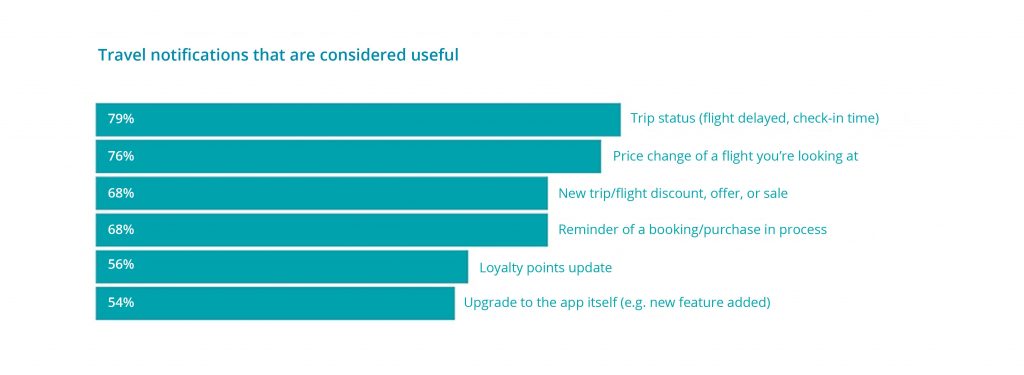
Other push notifications in a travel app may include:
Navigational notifications based on the location
They guide travelers in the airport between terminals or to their stay location. This function may be powered by beacon technology.
Luggage assistance
These push notifications inform travelers on where to pick up their baggage upon arrival.
Suggestions for nearby activities and places
In-app messages that point to nearby locations for renting a car or eating, or booking an appointment at a local spa.
Contextual experience that travelers enjoy
These may offer things that travelers love to do based on their personal history. For instance, it could be suggestions on visiting certain places of interest around the city.
Weather and info on disruption
Users should be warned of extreme weather changes or other force majeure circumstances in advance.
The type, content, and frequency of push notifications should be based on a user’s past travel history, in-app behavior, location, and browsing habits. You can mix up “nice-to-know messages” and reminders to enhance the customer experience. Include topical and relevant notifications that relate to the individual user’s immediate context, but avoid bombarding users with messages. Based on a user’s reaction to the notifications, update the content and quantity of the messages in the app.
6. Mobile Boarding Passes in Airline Apps
Mobile boarding passes make printing out paper ones obsolete. It’s common practice for users to check in electronically and download a boarding pass on a mobile device.
Consider integrating mobile boarding passes into a mobile wallet — a separate app commonly installed on mobile devices by default. Boarding passes have to be saved in matching formats for users that have mobile wallets.It is a smart move to cater to users who have a digital wallet. While boarding the plane, they can show their digital boarding passes on their locked screen mobile devices. It’s quite convenient, as the pass is always there and a traveler doesn’t need to search for it in mobile emails. Apple Wallet on iPhones, Android Pay on Android, and Samsung Pay on Samsung are the most popular electronic wallets.
Wrapping Up
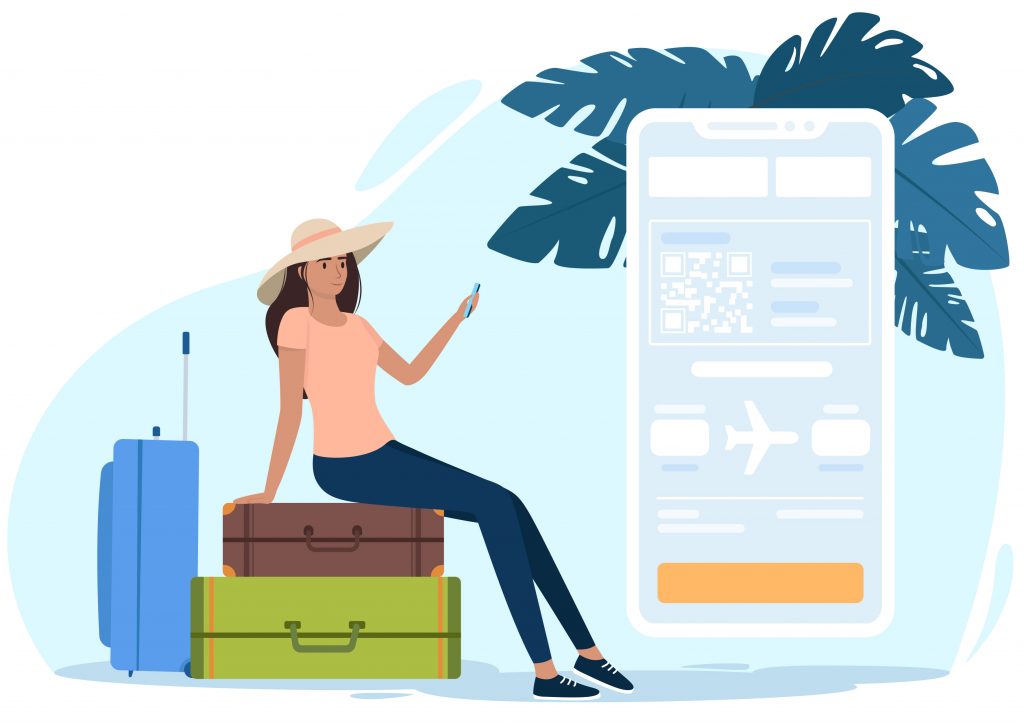
If you are a user, travel apps help you make and manage your bookings more conveniently and cost-effectively. Tourism companies can market and sell their services more efficiently through a mobile travel app. If you aim at bringing together supply and demand through an innovative solution, it may be very profitable. A well-designed mobile booking app can be beneficial to all parties.
The creation of a booking app calls for the guidance of experienced UX/UI designers and dedicated app developers. If you would like to order booking app development or to add a booking system to your app, or want to know more, please drop us a line!
Content created by our partner, Onix-systems.
 Home
Home